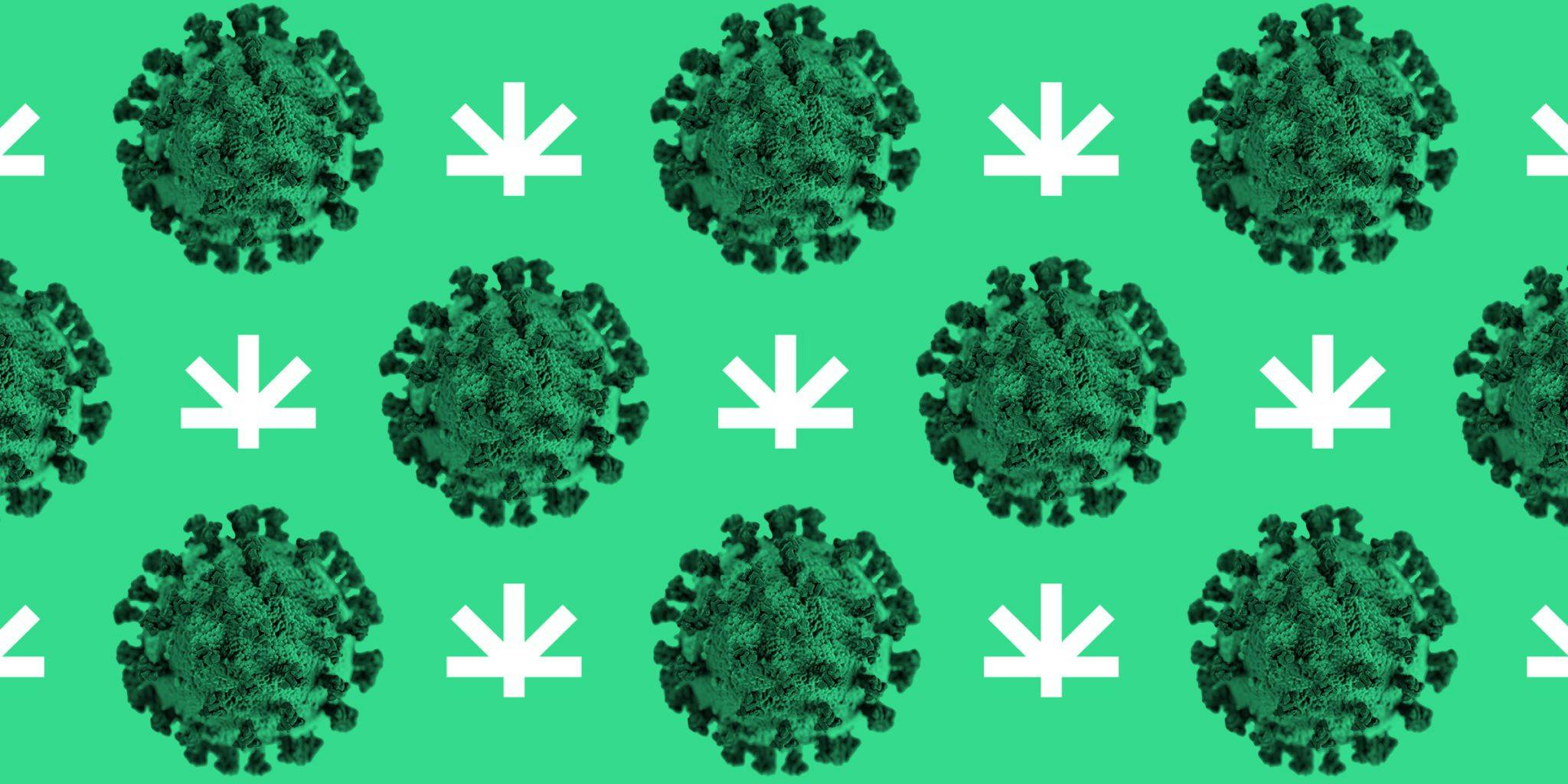Cannabinoids Successful Stopped COVID-19 Infection in Lab Study
Last updated on Oct 7, 2024
Created on Jan 18, 2022

Article written by

Dipak HemrajMedical Cannabis Researcher
Content reviewed by

Dr. Lewis Jassey
Since the start of the COVID-19 pandemic, people have been wondering if medical cannabis could be useful in treating the health condition. One study, published in 2020, suggests that CBD could essentially block COVID-19 from entering the body in the first instance. The virus binds to ACE2 (angiotensin-converting enzyme) receptors in the lungs, nose, throat, gastrointestinal tract and kidneys. CBD “closes the ACE2 door”, and restricts COVID-19’s entry into the building. ACE2 receptors protect our lungs from injury, and also play a role in regulating blood pressure, wound healing and inflammation.
A more recent study by researchers affiliated with Oregon State University suggests that the acidic cannabinoids, cannabidiolic acid (CBDA) and cannabigerolic acid (CBGA), could have similar effects by blocking coronavirus proteins. Tetrahydrocannabinolic acid (THCA) also showed great promise, but high enough quantities were not available for the study.
Get your medical marijuana card
Connect with a licensed physician online in minutes.
Larger purchase limits Access to higher potency strains Save up to 40% on product taxes Enhanced legal protection
How CBGA and CBDA Stopped COVID-19 in the Study
CBDA and CBGA bind to the spike protein of SARS-CoV-2, preventing the virus from entering cells and causing infection. What’s more is that both cannabinoids had similar effects on COVID variants, including ones found in the United Kingdom (Alpha), India (Delta) and South Africa (Omicron). This helps open up new avenues of treatment, as vaccine development and rollouts take time, and we need a variety of medications for new strains of the virus.
In terms of how CBDA and CBGA worked in the study, lab tests on cells in an organic sample (an assay) showed that the cannabinoids bind to the virus and disrupted its ability to attach to ACE2 receptors and replicate itself. The precise mechanism of how CBGA and CBDA do this is not fully known, but they attach to both orthosteric sites (the main, active part) and the allosteric sites (the indirect part) of the virus.
This means that CBDA and CBGA essentially “block” the parts of the protein that attach to the ACE2 receptors. If we think of ACE2 receptors as the “lock” and COVID-19 as the “key”, CBDA seems to “shield” the key and reduce the chances of it fitting into the lock, whilst CBGA changes the shape of the key so it can no longer fit into the lock in the first instance.
This mechanism of action has two main benefits:
- It helps reduce viral replication considerably
- It makes it harder for the virus to evolve into new variants
Marijuana and COVID-19: What the Other Research Says
There is both positive and negative news when it comes to medical marijuana for COVID-19 and other coronavirus & influenza-like infections.
Positive
- Another study by the University of Waterloo found that cannabidiol (CBD) “appears to prime the innate immune system of cells, potentially offering protection against pathogens such as SARS-CoV-2.” CBD seems to “speed up” the rate at which it detects the virus, and boost the immune system’s ability to react to COVID-19 before it infects further cells.
- Our own research suggests that medical cannabis may be useful for the treatment of post-COVID (long COVID) symptoms. There is some suggestion that CBD ‘s ability to modulate the immune system can treat cytokine storms (when the immune system goes haywire and attacks healthy as well as infected human cells), lung inflammation, and post-viral chronic fatigue syndrome.
- There is some limited evidence (and anecdotal) that cannabis may help treat H1N1 virus, aka “swine flu”. The idea that cannabinoids may help treat some types of respiratory infections is not unheard of.
Negative
- Inhibiting inflammatory responses using cannabis can, in cases of some types of infectious diseases (particularly flu-like ones), increase the likelihood of virus replication. Other research supports some of these findings.
- There is an increased risk of COVID-19 breakthrough infection in fully vaccinated patients with substance use disorder (SUD), including cannabis use disorder (CUD). However, socioeconomic factors, smoking cannabis, and tobacco use may all play a part in this increased risk.
The Bottom Line: Can Using Cannabis Prevent COVID-19 Infections?
Although the studies show some promise, there is no definitive evidence that cannabis use can prevent COVID-19 infections. It is important to remember that the studies so far are lab studies done on cells, not people, who are much more complex organisms.
The study also suggests that high doses of CBDA and CBGA would be needed for its COVID-19 blocking effects – far higher concentrations than can be found in most commercial varieties available today. However, it should be noted that it is within the realm of possibility to create such high quantities of pharmaceutical-grade CBDA and CBGA, so it’s not impossible to create such medications.
So, to put it simply, no, your everyday variety of cannabis will not prevent you from getting a COVID-19 infection. Smoking cannabis may also prove detrimental to some extent, although this may be mitigated somewhat by lifestyle choices (e.g. diet, exercise, utilizing other ingestion methods, not sharing vaping or smoking equipment, social distancing etc.).
Where your normal, typical varieties of medical cannabis may help is in managing the stress and anxiety of dealing with the pandemic. It can help you get a good night’s sleep and improve appetite as well, which certainly does give the immune system a boost and increase the likelihood of fighting off an infection!
Get Your Medical Card
Connect with a licensed physician online in minutes.
Larger purchase limits Access to higher potency strains Save up to 40% on product taxes Enhanced legal protection